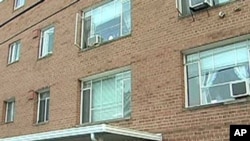Owning your home was once part of the American dream. But that dream has faded because of the economic recession in the United States. Millions of Americans have been unable to pay the mortgage on their houses and have had to leave them. Without a home of their own, many people are now renting, but this also can be difficult financially.
Until recently, Brenda Ganaway lived in a home of her own in Alexandria, Virginia, a suburb close to Washington, D.C. But then the economic crisis hit and she was unable to keep paying the mortgage on her house. "We were behind on a few payments and we couldn't get a loan anywhere, so they just immediately foreclosed it and told us we had a certain amount of days to leave," she explained.
There are millions of people like Brenda Ganaway in America now. Raphael Bostic is the assistant secretary at the U.S. Department of Housing and Urban Development, or HUD. He says the number of Americans who own their homes is steadily dropping. "The homeownership rate in the United States used to be somewhere close to 70 percent. We've fallen off by several million households now," he said. "And so the rate is down considerably. And a lot of those have now gone into the rental market."
Renting does have some advantages over home ownership. If a renter wants to move, for example, he does not have to worry about finding a buyer for the house.
Yazgul Odekova manages a rental property in Alexandria. She says the major reason people rent is that it is usually less expensive than owning a home. "People rent for different reasons. Number one is affordability," she said. "It is cheaper to rent and it is risk-free."
Renting is cheaper for many reasons, says Arun Shu. He is an international businessman who rents a home near Washington. He says there are many costs to owning a house besides paying the monthly mortgage. "If you decide to buy a house, a lot of expenses are involved. Not only payment if you take a mortgage, but also you have to pay property tax, maintenance and upkeep of the house," he said. "You probably will want to spend some money on renovating the house, remodeling parts of the house if you buy [a] used house."
But even renting can be difficult in today's market, especially in big cities. Danilo Pelletiere is an official at the National Low Income Housing Coalition. He says there just are not enough homes to rent and poor people are the most affected. "In the United States there has been a focus both at the local level and a national level on home ownership. That affected renters, low-income people and the like and a result you have shortage of three million units of affordable housing for lowest income people," he said.
Even if a house is available, Mr. Pelletiere says, being able to pay for it is another problem. To afford the rent, he says, many poor people work more than one job. "Today you need multiple minimum wage jobs to be able to afford a two-bedroom apartment," he added. "We calculated about $18 an hour."
Even if a person can afford the rent there are other obstacles. Yazgul Odekova, the property manager in Alexandria, says most people just do not meet the necessary qualifications, such as being able to prove they can afford the rental payments. "Right now from every 10 application we turned down nine. It is not just because people are dishonest. Sometimes people have big medical bills, sometimes people have bankruptcy, because suddenly they became sick and don't have health insurance. Sometimes peoples' income is very low, sometimes it is unstable relationship between people," Odekova said.
HUD's Raphael Bostic says the U.S. government has programs to help low-income families pay the rent. "We provide direct subsidy where we try to make sure that families are not overly burdened [so we don't wanna go over that 30 percent ratio], but that they can get into some decent high-quality housing," Bostic said.
But most analysts agree that until the U.S. economy improves, buying a home or renting one will be especially hard for low-income people.
News
High Cost of Housing in US, Unable to Buy or Rent
update




